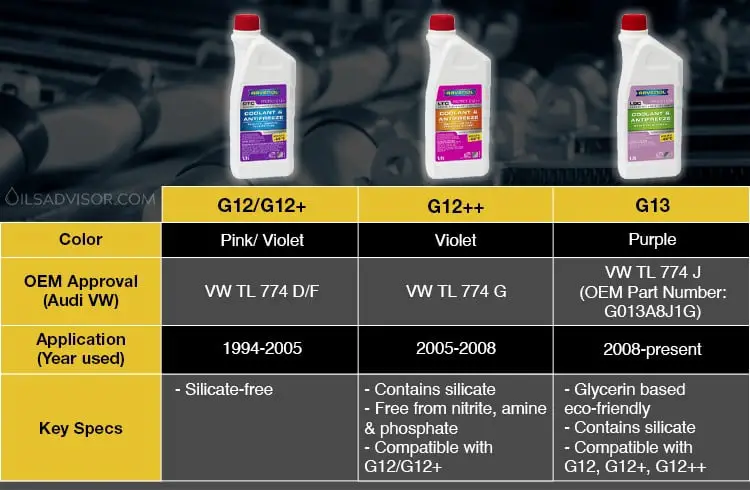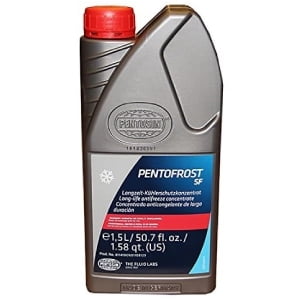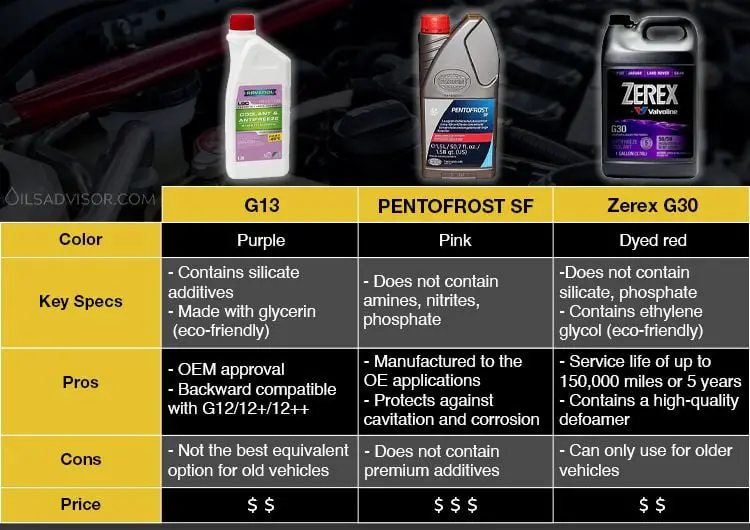G12 coolant is OEM-approved used in VW and Audi vehicles. However, the product has been discontinued. This makes many VW owners switch to equivalent options.
If you drive a VW/ Audi and look for alternatives to your G12 coolant, then you are in the right place!
This article reviews some best alternative coolants to replace your G12 from Ravenol (G12++, G13), Valvoline, and Pentosin. Interestingly, these alternatives are more affordable and deliver almost the same benefits as the OEM antifreeze.
Let’s get started!
What is G12 Coolant?
G12 is an OEM coolant specified for most VW and Audi vehicles manufacturers between 1996 – 2002. It is free-silicate and based on ethylene glycol and carboxylate compounds. The antifreeze has a pink color, and it’s specified for VW TL 774 D/F.
G12 Coolant Equivalent
- Before pouring another different coolant into your vehicle, ensure to flush out the remaining old coolant. If you don’t flush out the old coolant, it may contaminate the new one and cause damage to your car’s cooling system.
- Never use a coolant for Asian vehicles in any VW models.
Hereunder are the best alternative coolants you can use in place of the OEM G12 coolant. They deliver exception protection and good performance. You can choose between using the OEM equivalents or recommended universal substitutes.
Related: List of Approved Oils Meeting VW 502 00 Standard
G12+, G12++, G13: OEM Approved
G12+ (G12 Plus) Coolant

G12+ is free-silicate and based on ethylene glycol and carboxylate compounds.
G12+ (G12 plus) is another OEM coolant for use in most vehicles where G12 is specified. As you may guess, the G12+ coolant is not so different from its predecessor. The significant difference between G12 and G12+ is that the latter is more eco-friendly than the former. Also, G12+ has a violet color and contains improved anti-corrosion additives.
G12++ (G12 Plus Plus) Coolant

G12++ (G12 Plus Plus) is almost the same as the G12+ coolant. However, it is formulated with much more advanced additives – silicate additives.
Similarly, G12++ (G12 Plus Plus) is almost the same as the G12+ coolant. This new lubricant also has the violet color. However, as a newer variant, the G12++ is formulated with much more advanced additives – silicate additives. The presence of silicon additives provides better corrosion protection for VW cooling system.
Note: G12+ and G12++ are not the best-suited coolants for newer VW and Audi vehicles.
G13 Coolant

G13 is the newest OEM equivalent of G12. This more recent coolant is formulated with silicate additives for maximum aluminum protection
The introduction of the G13 discontinued the G12 series. G13 is the newest OEM equivalent of G12. This more recent coolant is formulated with silicate additives for maximum aluminum protection. More so, these silicate additives are the reason why the G13 coolant is ideal for long-term use on modern radiators (primarily those made with magnesium alloy, aluminum, or cast iron).
This antifreeze has a purple/violet color. It is tested to have the same cooling and antifreeze performance as the G12++ coolant. Moreover, the coolant is made with glycerin, a by-product of mineral oil. Glycerin is poised to be more eco-friendly than glycol.
So what is the downside of the product?
Since it contains silicates, it is not recommended for older radiators made from copper or brass. If you own a VW from 1994 – 1999, this item is not an ideal pick to use in place of G12.
Compatibility of G12, G12+ / G12++, and G13
- G12+ is compatible with VW and Audi models, where G11 or G12 are the OEM-recommended coolants. Mostly models from 1994 – 2000.
- G12++ is compatible with all VW radiators, and it delivers superb cooling and antifreeze performance. However, it does not contain glycerin, which is the selling point of the G13 coolant.
- The latest updated version G13 specs are compatible with the old ones that VW used previously. Hence, you can mix this coolant with the earlier G12, G12+, and G12++. However, I do not recommend mixing the different types of coolant even though they are miscible. This can cause corrosive protection loss.

G12+

G12++

G13
The table below shows the compatibilities and differences between G-series antifreeze.

Pentosin/ Pentofrost SF (without silicates)

The Pentosin coolant is an eco-friendly antifreeze. It does not contain amines, nitrites, phosphorus additives, and silicates
The Pentofrost SF coolant is an eco-friendly antifreeze for water-cooled engines. It does not contain amines, nitrites, phosphorus additives, and silicates. However, it delivers acceptable protection and cooling performance. This coolant meets the following specifications, ASTM D-3306, TL 774 F, and it’s approved for Ford, GM, and Land Rover vehicles. Pentofrost SF has a pink color.
This antifreeze is concentrated, so you need to mix it with distilled water as stated on the label on the bottle.
Pros
- Manufactured to the OE applications
- Protects against cavitation and corrosion
- Meets ASTM D-3306 and TL 774 F specifications
Cons
- More expensive than the OEM coolant
- Does not contain premium additives
Zerex G30 Phosphate and Silicate Free

ZEREX G30 is phosphate-free and silicate-free antifreeze/coolant. It contains ethylene glycol for optimal protection.
Valvoline ZEREX G30 is a premium phosphate-free and silicate-free antifreeze/coolant. According to the manufacturer, this antifreeze “incorporates state-of-the-art organic acid technology” and contains ethylene glycol for optimal protection.
Glycol is the organic compound used in G12 and G12+ formulas. It is eco-friendly but does not measure up to G13’s glycerin compound. You can use this on older models of GM, Jaguar, and VW vehicles.
ZEREX G30 is in dyed red color. It is a prediluted coolant, so do not add water when using it. Just add it directly to your car.
Pros
- Contains a high-quality defoamer
- Service life of up to 150,000 miles or 5 years
- Provide better protection for hoses, gaskets, or plastics
- Cheap price
Cons
- Can only use for older vehicles
Bonus: Can I use G40 instead of G12?
Many car owner are confused about G40 and G30. They think that the G40 is the same as the G30 and can be used instead of G12. But I must say: No, G40 is not compatible with G12. Instead, it is the G12++ (G12 Plus Plus) that is compatible with G40. You can use G40 to substitute G12++, and everything would still work very well.


G13

Pentofrost SF

ZEREX G30
Related: Coolant Boiling In Reservoir: Causes & Solutions
Final Verdict
Summarily, these are the best G12 coolant equivalents in the market. However, it is important to reiterate the need to flush out your old coolant before pouring another different coolant.
I recommend you to stick to OEM coolant if your VW vehicle is under warranty. Otherwise, the dealer might void it.
When you want to look for a cheaper alternative, ZEREX G30 is a good equivalent option. However, Pentosin is more popular than ZEREX because it is OEM recommendation. But the high price makes it a big downside for the product. You can consider these factors to pick the right item for your VW.

ZEREX G30

Pentofrost SF